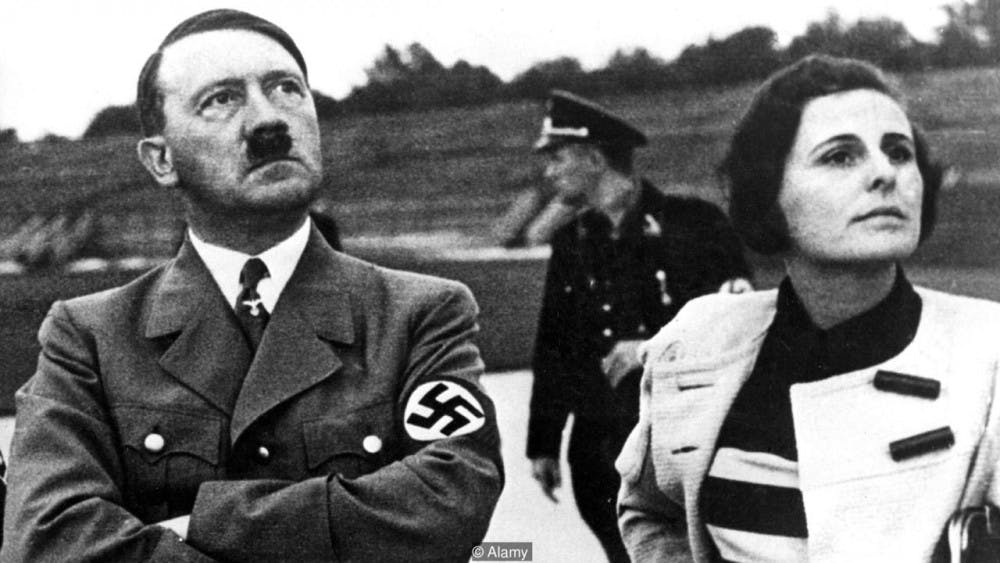It’s Women’s History Month! What better way to begin than by highlighting the work of a Nazi filmmaker? No, I’m not kidding.
Now let me explain my choice to cover her. Let’s say you really dislike someone. You think they’re arrogant, annoying, mean and a handful of other synonymously awful things. But here’s the catch: that person is still insanely talented. You may hate them, but they can dance, act and direct, and that makes you angry. That basically summarizes my feelings towards Leni Riefenstahl. She’s responsible for crafting Nazi propaganda for Hitler, but at the same time is an incredibly talented filmmaker. In fact, Riefenstahl is the first female filmmaker to garner international attention. Of course one of the first famous female filmmakers would be a Nazi.

Image from mtholtok.edu
Despite my dislike of her as a person, we do need to talk about dear old Leni. Riefenstahl grew up in Germany in the first decade of the 20th Century. Initially working as a dancer who was talented enough to tour Europe at 22, she started starring in various films (specifically in the “German Mountain Film” genre) at the age of 24. Obviously she had a lot going for her, so how exactly did this talented young women become one of history's most controversial filmmakers?
After being inspired by one of Hitler’s speeches, Riefenstahl contacted the man himself and the two began correspondance with one another. Riefenstahl’s first film Das Blaue Licht or “The Blue Light” impressed Hitler so much that he actually asked her to film the annual Nuremburg Rally. The result of Hitler’s request is Sieg des Glaubens or “Victory of the Faith,” a film that Riefenstahl later deemed unimpressive. When Hitler next asked Riefenstahl to create Triumph des Willens, better known as Triumph of the Will, Riefenstahl was given assurance that no one would meddle in her work giving her unwavering support and artistic freedom. To quote an article by Kara Peterson from St. Edwards University,
“She had thirty cameras in operation in order to make the film. Special bridges, towers, and ramps were built by the city of Nuremberg solely for the production of this film. Dollies were built to move along with marching troops, fire trucks were used to get unique shots of monuments throughout the city, and there was even a 120-foot flagpole that had been outfitted with an electric elevator in order to get wide shots from a bird’s eye view.”
As you can see, no expenses were spared.
Triumph of the Will is dripping with Nazi imagery: marching banners, shots of Hitler placed above a sea of Nazi soldiers, and plenty of Germans screaming in admiration of their leader. It successfully makes Hitler appear godlike: powerful and admirable in every shot he’s in. More importantly, the film is shot expertly. Hitler is always framed at a low angle, putting him in a constant position of power. However, we also see a more human side to Hitler; he’s often smiling, laughing and interacting with people.

Image from The Birmingham Mail
Kevin Jack Hagopian, a Senior Lecturer in Media Studies at Pennsylvania State University perfectly summarizes Riefenstahl’s effective filmmaking and comments that “Hitler's moves, every one of them, whether bellicose or bathetic, are designed to elicit a Pavlovian response from the crowd, and, with the help of Riefenstahl's editing, they do.” With these two drastically different portrayals, Hitler is shown not as an evil dictator but someone you can talk to, laugh with and even relate to. If you were a German watching the film in 1935, it isn’t a leap to assume you may be taken in by the propaganda. Once again I’ll turn to Kevin Hagopian to emphasize the massive effect of Riefenstahl’s editing:
“That the world did not take him seriously, or judge him [Hitler] against a less relative standard of morality - in the year after Triumph of the Will's release, Hitler as named Time magazine's 'man of the Year' - is no fault of Leni Riefenstahl's, for the Hitler she gives us is plainly a weapon of mass destruction. “
Triumph of the Will is still the example of propaganda film. It is so influential that Frank Capra screened Triumph of the Will for filmmaking tips when he was commissioned by the United States government to make the “Why We Fight” propaganda films. Capra isn’t the only one that used the film as an influence either. Charlie Chaplin’s The Great Dictator, one of the most infamous satire films of all time, largely draws from the film. Not only did Triumph of the Will become a reference for other propaganda and films, the film won the award for Best Foreign Film at the Venice Film Festival in 1935.
Let me break this down: Hitler’s top filmmaker, the woman largely responsible for Nazi propaganda, is an international, award winning filmmaker. That doesn’t exactly seem fair.
So here is the question that is constantly posed in regards to the film: can art be considered great, but morally deplorable? This is definitely a controversial question and many may disagree with me, but I argue that the answer is yes.
Do not misunderstand me, by creating this film Riefenstahl aided the Nazis in their conquest, and for that she deserves nothing but criticism. However, her work is indisputably effective. While I hate how she used her talents and resent the purpose of Triumph of the Will, it doesn’t change the fact that it was effective in its purpose: to make the Nazis look awesome.
Sadly she did that. And she did is well.
Triumph of the Will should be seen by everyone. Like I said before, this is the prime example of how propaganda works. If more people watch and learn from it, more people may be able to identify media that may have questionable motives. Leni Riefenstahl may be a great filmmaker, but that does not automatically excuse her poor morals in making the film. She should be held completely responsible for all of the negative consequences stemming from her propaganda.
Next week we’re going to continue our look into Leni through a more lighthearted film, Olympia, a documentary in the same propagandistic vein as Triumph of the Will that covers the 1938 Summer Olympic Games hosted in Berlin.
Sources: Wikipedia, Kara Petersen, New York State Writer's Institute, The BBC
Images: The Birmingham Mail, YouTube, mytholtok.edu
















